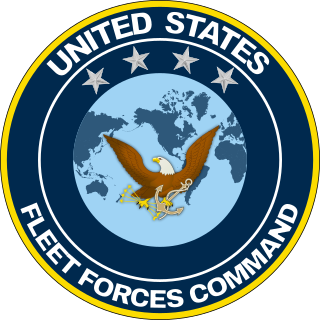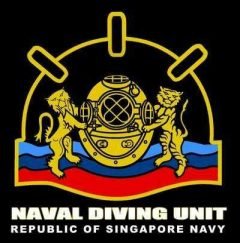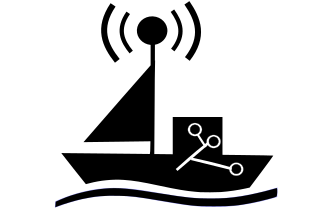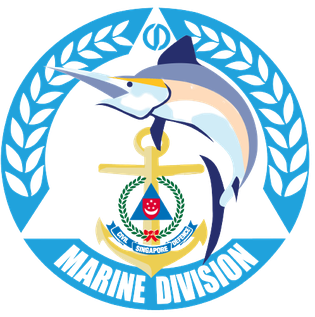
The United States Fleet Forces Command (USFF) is a service component command of the United States Navy that provides naval forces to a wide variety of U.S. forces. The naval resources may be allocated to Combatant Commanders such as United States Northern Command (USNORTHCOM) under the authority of the Secretary of Defense. Originally formed as United States Atlantic Fleet (USLANTFLT) in 1906, it has been an integral part of the defense of the United States of America since the early 20th century. In 2002, the Fleet comprised over 118,000 Navy and Marine Corps personnel serving on 186 ships and in 1,300 aircraft, with an area of responsibility ranging over most of the Atlantic Ocean from the North Pole to the South Pole, the Caribbean Sea, Gulf of Mexico, and the waters of the Pacific Ocean along the coasts of Central and South America.

The Seventh Fleet is a numbered fleet of the United States Navy. It is headquartered at U.S. Fleet Activities Yokosuka, in Yokosuka, Kanagawa Prefecture, Japan. It is part of the United States Pacific Fleet. At present, it is the largest of the forward-deployed U.S. fleets, with 50 to 70 ships, 150 aircraft and 27,000 Sailors and Marines. Its principal responsibilities are to provide joint command in natural disaster or military operations and operational command of all US naval forces in the region.

The South African Navy (SA Navy) is the naval warfare branch of the South African National Defence Force.

Standing Royal Navy deployments is a list of operations and commitments undertaken by the United Kingdom's Royal Navy on a worldwide basis. The following list details these commitments and deployments sorted by region and in alphabetical order. Routine deployments made by the Navy's nuclear-powered submarines and their location of operations is classified.

The Republic of Singapore Navy (RSN) is the maritime service branch of the Singapore Armed Forces (SAF) responsible for defending the country against any seaborne threats and as a guarantor of its sea lines of communications. The RSN traces its origins to the Royal Navy when Singapore was still a crown colony of the British Empire. The service was formally established in 1967, two years after its independence from Malaysia in 1965, and had undergone a substantial modernisation ever since – which has led them into becoming the most powerful navy in Southeast Asia.

The Naval Diving Unit (NDU), also referred to as the Naval Divers, is the special forces formation of the Republic of Singapore Navy (RSN) responsible for conducting special operations from sea, air, and land. The formation is made up of six squadrons, specialising in explosive ordnance disposal, underwater demolition, maritime security operations, and combatant craft operations.

The Commander-in-Chief Fleet (CINCFLEET) was the admiral responsible for the operations of the ships, submarines and aircraft of the British Royal Navy from 1971 until April 2012. The post was subordinate to the First Sea Lord, the professional head of the Naval Service. In its last years, as the Navy shrank, more administrative responsibilities were added.

The Protector unmanned surface vehicle (USV) was developed by the Israeli Rafael Advanced Defense Systems in response to emerging terrorist threats against maritime assets such as the USS Cole bombing, and is the first operational combat USV in service. It is fitted with a Mini Typhoon Weapon Station. In 2005, it was deployed by the Singapore Navy to support coalition forces in the Persian Gulf, and was later deployed for anti-piracy duties in the Gulf of Aden. In 2012, Rafael announced that they were building a larger version of the Protector, that would have a greater range, and be equipped with a wider range of weaponry.

The Police Coast Guard (PCG) is a division of the Singapore Police Force that combines the functions of marine police and coast guard in Singapore. Its duties include the law enforcement and search and rescue operations in collaboration with the Maritime and Port Authority of Singapore and the Immigration and Checkpoints Authority. It is headquartered at Brani Regional Base on Pulau Brani.

An unmanned surface vehicle, unmanned surface vessel or uncrewed surface vessel (USV), colloqually called a drone boat, drone ship or sea drone, is a boat or ship that operates on the surface of the water without a crew. USVs operate with various levels of autonomy, from remote control to fully autonomous surface vehicles (ASV).

The Typhoon is a type of remote weapon station manufactured by Rafael Advanced Defense Systems of Israel, and it shares similar design principles and common technologies with Samson Remote Controlled Weapon Station, a land-based system manufactured by the same developer. Like Samson RCWS, Typhoon is also multi-configurable.

The Fearless-class patrol vessels were built by Singapore Technologies (ST) Marine for the Republic of Singapore Navy (RSN) in the 1990s. Four remain in service with the RSN, as modified Sentinel-class maritime security and response vessels (MSRVs). Derivatives of the type are also in service in the navies of Brunei, Oman, and the United Arab Emirates.

The Bedok class are mine countermeasures vessels of the Republic of Singapore Navy (RSN). They play an important role in the maritime security of Singapore, ensuring that the Singapore Strait and the sea lanes surrounding Singapore remain mine-free and open to international shipping. It is estimated that closure of Singapore's ports would result in direct trade losses amounting to more than US$1.2 billion daily, posing a serious threat to Singapore's economy. The four ships form the Sixth Flotilla of the RSN.
Fleet Command is responsible for the command, operations, readiness, training and force generation of all ships, submarines, aircraft squadrons, diving teams, and shore establishments of the Royal Australian Navy. Fleet Command is headquartered at HMAS Kuttabul in Sydney, and is led by the Commander Australian Fleet (COMAUSFLT), also referred to as Fleet Commander Australia (FCAUST), which is a rear admiral (two-star) appointment.

The ASW Continuous Trail Unmanned Vessel (ACTUV) is a DARPA funded project launched in early 2010 to develop an anti-submarine drone. ASW is an acronym for Anti-Submarine Warfare. In January 2018 after successful sea trials it was announced that the "Sea Hunter" prototype has transitioned from DARPA to the Office of Naval Research for further development.

The Fleet-class unmanned surface vessel, also called the Common Unmanned Surface Vessel (CUSV) and later the Mine Countermeasures Unmanned Surface Vehicle, is an unmanned surface vessel designed for the United States Navy to be deployed from Freedom and Independence-class littoral combat ships and intended to conduct mine and anti-submarine warfare missions. As of 2012 four units of the class have been built; the first was delivered to the U.S. Navy in 2008.
ULAQ is the prototype of the first Turkish armed unmanned surface vessel (AUSV).
The JARI USV is an uncrewed surface vehicle developed by the China Shipbuilding Industry Corporation (CSIC), specifically between its No. 716 Research Institute, the Jiangsu Automation Research Institute (JARI), and No. 702 Research Institute, China Ship Scientific Research Centre (CSRRC). The uncrewed warship is designed for potential use for the People's Liberation Army Navy and export customers.
The Maritime Security Task Force is a high-readiness standing task force of the Republic of Singapore Navy (RSN) responsible for maritime security operations.

The SCDF Marine Division is a division of the Singapore Civil Defence Force (SCDF) that is in-charge of marine fire and rescue operations in Singapore waters. Its duties include the marine firefighting and maritime search and rescue operations in collaboration with the Maritime and Port Authority of Singapore. It is headquartered at SCDF Marine Division HQ Brani Base on Pulau Brani.

















